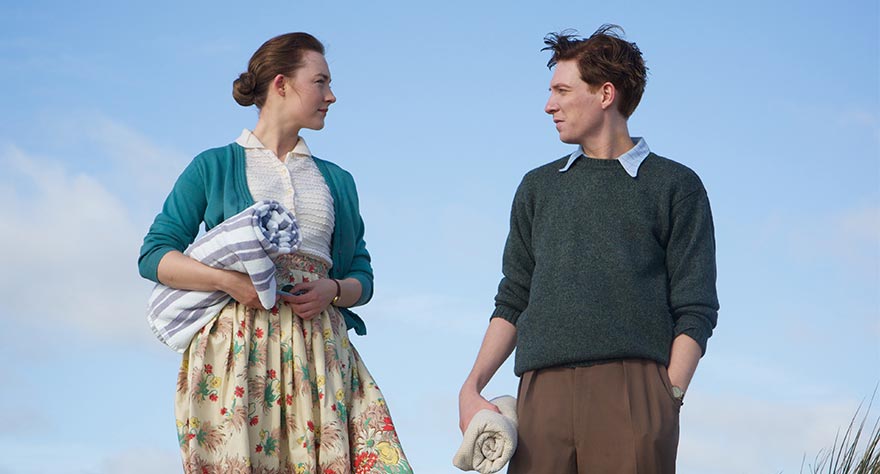
An enchanting and moving story of cultural identity, romance, and life's most difficult choices.

An enchanting and moving story of cultural identity, romance, and life's most difficult choices.
Stories centered around the American immigration experience in many ways seem akin to the creation myths of much older countries. But whereas gods and goddesses may have divined their countries from the stars or sea or some other mysticism, America was built slowly over time. Be it migrant Asian natives who would form the beginnings of Native America, wandering from a now non-existent peninsula 24,000 years ago, or the slow but steady trickle of peoples from every nation on the planet seeking shelter, work, and freedom. Nothing inspires American pride more than tales of how we got here. John Crowley‘s Brooklyn isn’t exactly a creation story, in fact, it takes place in the ’50s years after the immigration boom to America, but this story—adapted by Nick Hornby from Colm Tóibín’s novel—encompasses that very real part of being American: balancing history with the future and learning to belong.
The young woman walking that fine line is Eilis Lacey (Saoirse Ronan), an Irish girl who is given the chance to move to America when job prospects in her small Irish town run dry. Her part-time job working in a convenience store is easy to say goodbye to—what with her boss being a stuck up gossip and all—and even her friends have romantic prospects and more contentment in their small town life. The hardest part for Eilis is leaving her elder sister Rose (Fiona Glascott) behind with their mother Mary (Jane Brennan), but she is assured by Rose that this is the right decision.
So Eilis departs, traversing literal rough seas on the voyage to America. Her bunkmate aboard the ship advises her, giving her a crash course in how to survive being alone in America so far from home. But nothing really prepares Eilis for just how homesick she becomes. Her boarding house-mother, Mrs. Kehoe (Julie Walters), holds nightly dinners, and these scenes are by far the most hilarious of the film, perfectly showcasing the variety of young women making their way in America, from old-fashioned to flashy and stylish. Mrs. Kehoe is the perfect blend of old Irish propriety curbed with sharp modern spunk and the way she chides Eilis’s more rambunctious cohorts and advises the girls on their skin regimens is just one of many great examples in the film of the way the women around Eilis are her greatest support system. When Eilis’s homesickness pushes her to sullen depression it prompts her new boss, Miss Fortini (Mad Men‘s Jessica Paré), to call in the priest who sponsored Eilis’s trip to America. Jim Broadbent plays Father Flood, who enrolls Eilis in a bookkeeping school in order to give her something to focus on to distract her from her sadness.
The plan works remarkably and as Eilis begins to invest in her future she starts to let down her guard. At a church dance one Saturday night Eilis is asked to dance by Tony (Emory Cohen), a young man who is instantly quite taken with Eilis’s quiet charm and fierce intelligence. He pursues her vigilantly, and to Eilis he is so completely American. His family is Italian, but their cultural background differences only make them more drawn to one another. Eilis’s spirits raise considerably—her wardrobe even brightens, and indeed the costume design is among the many details that elevate the film—and she and Tony allow themselves to fall head over heels.
But when tragedy strikes back home in Ireland, Eilis is thrust back into her previous world, and when she returns home she has to face her old life as a new person. Ronan magnificently portrays Eilis’s depth of feeling and inner struggle with choosing what sort of life she wants to mold for herself. Now an independent young woman, she finds herself to be more desirable than ever back home and she is given very real temptation in the form of Jim (Domhnall Gleeson), a tall and successful young Irishman who seems to have the same sort of ambition as Eilis combined with a love for their home country.
Eilis’s decision essentially boils down to choosing whether she wants to choose to be Irish or Irish-American, each choice attached to a very different man who promises a very different future from the other. This conundrum feels so very close to the heart of American patriotism. That those who formed this country, whether it was on the Mayflower or many years later as an immigrant, each had to choose to be American. Crowley keeps Eilis’s decision harrowing to the end, maintaining that it isn’t necessarily about choosing correctly, as there is no clear path, it’s about choosing one’s own identity.
Brooklyn is at once inherently American and incredibly multi-cultural, showcasing just how intricate and emotional the immigration experience was for many who came to this country. That it uses the perspective of an empowered and vibrant young Irish woman is what makes Brooklyn an excellent story. It’s an across-the-ocean love triangle yes, but it’s the battle within Eilis that is most interesting. Yves Bélanger’s cinematography makes 1950’s Brooklyn both exciting and alien at first but ultimately more romantic as Eilis’s experience there changes. The imagery of Ireland feels much more spacious, open and home-like. Ultimately the film is beautiful, but it’s Ronan’s sparkling eyes and subtle expressions that cause not only Tony and Jim to fall in love with her, but in fact everyone else in the film and all in the audience as well.
A perfectly crafted romance and pride-inducing immigration tale, Brooklyn feels very much like reading an engaging book. One you just can’t put down and immediately want to re-read once it’s finished.